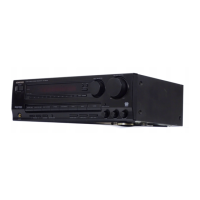
Do you have a question about the Kenwood KR-V6070 and is the answer not in the manual?
| Tuning range | AM/FM |
|---|---|
| Input Sensitivity | 200mV (line) |
| Speaker load impedance | 8 ohms |
| Inputs | Phono |
| Outputs | Tape |
| Dimensions | 440 x 150 x 380 mm (W x H x D) |
Details on selecting the correct AC voltage for operation, preventing damage from incorrect settings.
Important warnings about fire, electric shock, moisture, and servicing to prevent hazards.
Information regarding FCC regulations, potential interference, and user actions.
Guideline for CATV system installers regarding proper grounding of cable entry.
Explains Dolby Pro Logic for realistic sound and Dolby 3 Stereo for improved sound positioning.
Adds presence sound components for a movie theater-like listening experience.
Describes automatic input switching when KENWOOD components are connected via SYSTEM CONTROL.
Details the remote control's ability to operate other KENWOOD components connected via SYSTEM CONTROL.
Procedure to reset the microcomputer in case of operation errors or erroneous displays.
Explains automatic input switching and playback when KENWOOD components are connected.
Guide to setting the impedance selector based on speaker configuration and impedance for safe operation.
Instructions for connecting AM loop and outdoor antennas for optimal reception.
Guidance on connecting FM indoor and outdoor antennas for stable signal reception.
Setting the FM DE-EMPHASIS/CHANNEL SPACE switch for correct broadcast reception in different areas.
Identifies and explains the function of various buttons, knobs, and indicators on the front panel.
Details the buttons and their functions for operating the receiver and connected components.
Instructions for inserting batteries into the remote control unit for operation.
Steps for operating the system with the remote and its effective range.
Steps to turn on the unit, select speaker system, and choose the desired audio input source.
Guidance on adjusting volume and playing the selected source, including notes on input source memory.
How to adjust bass, treble frequencies, and the left/right sound balance.
Using the LOUDNESS key for low volume listening and muting sound temporarily.
Instructions for listening through headphones by disabling the main speakers.
Enabling line-straight playback for higher sound quality, bypassing tone controls.
Steps to select a source, prepare the cassette deck, and start recording.
Instructions for copying tapes between TAPE 1 and TAPE 2, including double cassette deck use.
Details on connecting and using the TAPE 2 (MONITOR) terminals for monitoring recorded sound.
Steps for selecting the tuner input, broadcast band, tuning method, and finding stations.
How to tune radio stations by directly entering their frequencies using numeric keys and the DIRECT key.
Procedure for storing favorite radio stations into memory using the MEMORY key and preset numbers.
How to recall individual preset stations by number or sequentially using the P.CALL key.
Steps to select the VIDEO 1 input and play a videotape on a connected video deck.
Instructions for selecting VIDEO 2 input and recording a video source onto a connected video deck.
Enhances center image positioning for improved dialogue clarity, requires center speaker.
Reproduces movie theater sound fields for video/LD software, requires rear and center speakers.
Adds movie theater reverberation to the sound for a more immersive experience, requires rear and center speakers.
How to activate DOLBY 3 STEREO and select the CENTER MODE for optimal sound.
Procedure to align center speaker volume with main speakers using test tone, and cancel the mode.
How to activate DOLBY PRO LOGIC, select CENTER MODE, and adjust delay time.
Procedure to balance volume levels for center/rear speakers using test tone and volume controls.
Steps to activate DOLBY PRO LOGIC mode and play a video software program.
How to cancel the mode and methods to calculate the proper delay time for optimal surround effect.
How to activate THEATER LOGIC mode and adjust center/rear speaker volumes.
Procedure to adjust delay time and cancel the presence play mode.
Steps to reset the microcomputer to resolve operational issues and erroneous displays.
Common symptoms, causes, and remedies for problems with the remote control unit.
Troubleshooting no sound, blinking STANDBY, or sound from only one speaker.
Resolving issues with no radio stations received, interference, or preset station recall problems.
Detailed technical specifications for audio output, power, and distortion for US and Canadian models.
Technical details for FM and AM tuner sections, including sensitivity, selectivity, and frequency response.
Specifications for power consumption, dimensions, weight, and video input/output.
Technical specifications for audio output, power, and distortion for models in other countries.
Technical details for FM and AM tuner sections for international models.
Specifications for power consumption, dimensions, weight, and video I/O for international models.